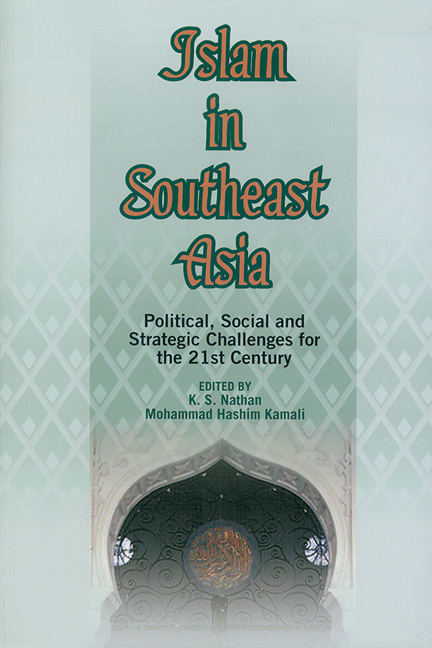Book contents
- Frontmatter
- Contents
- Preface
- Introduction: Understanding Political Islam Post-September 11
- PART ONE ISLAMIC DOCTRINE, HISTORY, GROWTH AND INSTITUTIONS IN SOUTHEAST ASIA
- PART TWO POLITICS, GOVERNANCE, CIVIL SOCIETY AND GENDER ISSUES IN SOUTHEAST ASIAN ISLAM
- PART THREE MODERNIZATION, GLOBALIZATION AND THE ‘ISLAMIC STATE’ DEBATE IN SOUTHEAST ASIA
- PART FOUR IMPACT OF SEPTEMBER 11 ON ISLAMIC THOUGHT AND PRACTICE
- CONCLUSION: Addressing the Challenge of Political Islam in Southeast Asia
- Note on Contributors
- About the Editors
- Index
CONCLUSION: Addressing the Challenge of Political Islam in Southeast Asia
Published online by Cambridge University Press: 03 November 2017
- Frontmatter
- Contents
- Preface
- Introduction: Understanding Political Islam Post-September 11
- PART ONE ISLAMIC DOCTRINE, HISTORY, GROWTH AND INSTITUTIONS IN SOUTHEAST ASIA
- PART TWO POLITICS, GOVERNANCE, CIVIL SOCIETY AND GENDER ISSUES IN SOUTHEAST ASIAN ISLAM
- PART THREE MODERNIZATION, GLOBALIZATION AND THE ‘ISLAMIC STATE’ DEBATE IN SOUTHEAST ASIA
- PART FOUR IMPACT OF SEPTEMBER 11 ON ISLAMIC THOUGHT AND PRACTICE
- CONCLUSION: Addressing the Challenge of Political Islam in Southeast Asia
- Note on Contributors
- About the Editors
- Index
Summary
Political Islam as an issue affecting our present and future, will remain a matter of great concern to Muslims as well as non-Muslims in this region, and the world as well. Parts I and II have highlighted the complexity involved, and the problematique associated with translating theory and doctrine to reality. Indeed, this is the biggest challenge facing all Muslims: to adapt, modernize, reform, and reinvent their social systems in as much as the non- Muslims too are doing the same — to develop relevant models of economic, political, social, cultural and religious life — that can empower us without undermining our freedom to choose, while at the same time enabling us to positively address the multi-faceted challenges confronting humanity in the twenty-first century. In this conclusion, the focus is not on “doctrinal Islam” but on “applied Islam”, that is, the political and strategic dimensions of Islamic activity as it affects Muslims and non-Muslims alike.
A question naturally arises whether Islam is inherently political or whether politicization of Islam is a historical phase and a circumstantial development brought into sharp relief in the latter part of the twentieth century. Political Islam emerged partly as a reaction to European colonialism and partly as an aspect of the nationalist movement that struggled for independence in the former colonies. For Islam is basically a faith and a state of mind founded on its renowned five pillars, namely, prayer, fasting, the hajj, the zakat obligation to help the poor, belief in God and the hereafter. These are not inherently political and Muslims can practise their religion without any political engagement in a party or government, or even in the absence of a government. Islam admittedly does not preclude government from the scope of its teachings, yet it remains to be said that state and government are not essential to the religion.
The question whether Islam is a religion (din) only, or both religion and state (din wa dawla) was addressed in the early decades of the twentieth century by Shaykh ‘Ali ‘Abd al-Raziq, a former judge and professor of the famous Al-Azhar Universityin Cairo, and at one time also Minister of Awqaf (religious endowments) of Egypt, who published a book bearing the title al- Islam wa Usul al-Hukm (Islam and the Principles of Government) in 1926.
- Type
- Chapter
- Information
- Islam in Southeast AsiaPolitical, Social and Strategic Challenges for the 21st Century, pp. 347 - 354Publisher: ISEAS–Yusof Ishak InstitutePrint publication year: 2005



